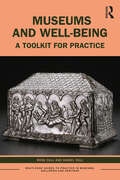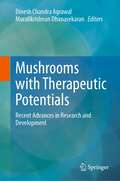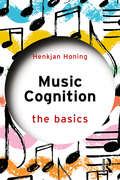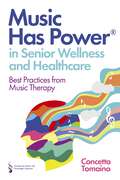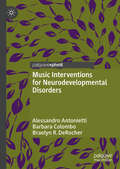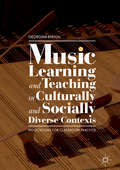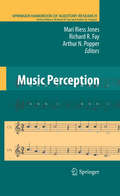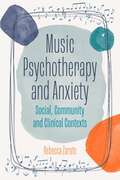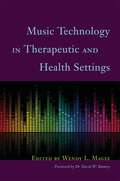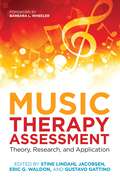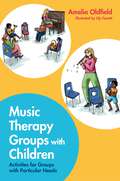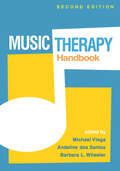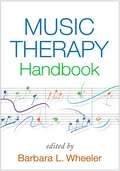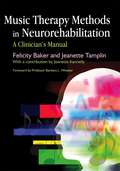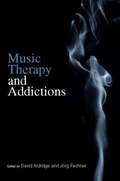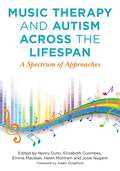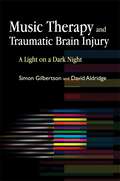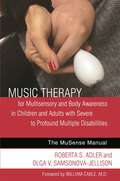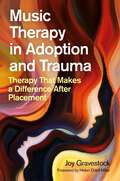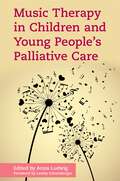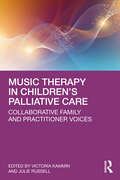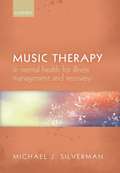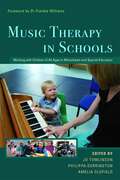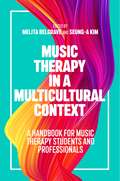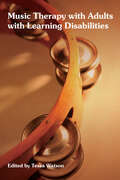- Table View
- List View
Museums and Well-being (Routledge Guides to Practice in Museums, Galleries and Heritage)
by Rose Cull Daniel CullMuseums and Well-being outlines the historical development of well-being within museums and offers a critical engagement with this field from a museum studies perspective. The essential thesis of the book is that well-being is a collective action. The book utilises the Five Ways to Well-being as a model: Connect, Be Active, Keep Learning, Give and Take Notice. Each of these Ways are explored through a specific museum object illustrating the important role collections can play in museum well-being. The book considers how museum well-being, and the austerity project became entwined, and how the COVID-19 pandemic supercharged growth in this field. The book explores such diverse topics as walking, slow art, social capital, Virginia Woolf, body positivity, collective joy, identity, art therapy, yoga, Squid Game, Effective Altruism, mindfulness, gift exchange, the Preston model, the limits of data, sketching, photography, inclusive spaces, and workplace well-being. The book signposts a vast array of existing information, and offers a critical engagement with current practices. Museums and Well-being is aimed initially to students of museum studies programmes, it is also an ideal book for museum staff who need to add a well-being component to their existing programming; or to reconsider existing programming from the perspective of well-being.
Mushrooms with Therapeutic Potentials: Recent Advances in Research and Development
by Dinesh Chandra Agrawal Muralikrishnan DhanasekaranThe book presents new and novel perceptions about ailments alleviating the effects of several mushroom species. Also, the book highlights the curative role of medicinal mushrooms on some peripheral and central diseases. Various chapters in the book (primarily reviews) have been dedicated to providing the therapeutic efficacy of mushrooms against respiratory illnesses, gut microbiota, COVID-19, dementia, epilepsy, mental ailments, cancers, cardiovascular, kidney-related diseases, and other common pathologies. Thus, medicinal mushrooms are current and future consumable healthcare products that usually exhibit nourishing properties and possess prophylactic and therapeutic values with minimal adverse effects and contraindications. The book focuses on Sustainable Development Goal (SDG 3) to promote healthy lives and well-being for all. Medical, pharmacy, nursing, and CAM (complementary and alternative medicine) students, practitioners, scholars, researchers, other healthcare professionals, and general readers are this book’s potential audience. The book can be adopted as a textbook for undergraduate and graduate courses so that the therapeutic potential of mushrooms can reach a wider audience. This book strives to create a new resource for the future use of medicinal mushrooms in various disorders.
Music Cognition: The Basics (The Basics)
by Henkjan HoningWhy do people attach importance to the wordless language we call music? Music Cognition: The Basics considers the role of our cognitive functions, such as perception, memory, attention, and expectation in perceiving, making, and appreciating music. In this volume, Henkjan Honing explores the active role these functions play in how music makes us feel; exhilarated, soothed, or inspired. Grounded in the latest research in areas of psychology, biology, and cognitive neuroscience, and with clear examples throughout, this book concentrates on underappreciated musical skills such as sense of rhythm, beat induction, and relative pitch, that make people intrinsically musical creatures—supporting the conviction that all humans have a unique, instinctive attraction to music. The scope of the topics discussed ranges from the ability of newborns to perceive a beat, to the unexpected musical expertise of ordinary listeners. It is a must read for anyone studying the psychology of music, auditory perception, or simply interested in why we enjoy music the way we do.
Music Has Power® in Senior Wellness and Healthcare: Best Practices from Music Therapy
by Concetta Tomaino The Institute of Music and Neurologic FunctionThe transformative role music therapy can play in all areas of healthcare, and especially in the care of older adults is increasingly apparent. However, while music activities are present in most care settings, these activities don't provide the therapeutic benefits that are possible with music therapy-informed interventions and programs. Best practices from music therapy are transforming dementia care, and have the potential to improve healthcare-and health-for older people, whatever their needs, wherever they receive care. Dr. Concetta Tomaino, a pioneer in the field of music therapy,. shares more than 40 years of clinical and research experience--not just with Music Therapists but also with healthcare leaders, clinicians, and direct care staff. With chapters on mental health and wellness, dementia, as well as movement and speech rehabilitation, this comprehensive and friendly practice guide will help all caregivers use music therapy best practices to provide better, more fulfilling support across all senior healthcare settings.
Music Interventions for Neurodevelopmental Disorders
by Alessandro Antonietti Barbara Colombo Braelyn R. DeRocherThis book explores how music can improve skills that are impaired in some neurodevelopmental disorders, including ADHD (attention deficit hyperactivity disorder), autism, and Rett syndrome. Rehabilitation interventions based on the use of music, termed “music therapy”, are relatively widespread, but not all are supported by empirical evidence. This book offers readers an updated and scientifically grounded perspective on this theory and argues that music can be effective in promoting the acquisition of some basic mental abilities. Chapters present some of the latest research and data on how musical activities can lead children affected by neurodevelopmental disorders to improve those skills, including examples of training programs and exercises. The book will be a valuable resource for therapists, rehabilitators, psychologists, educators, musicians, researchers, as well as anyone interested in exploring the potential in music for human growth.
Music Learning and Teaching in Culturally and Socially Diverse Contexts: Implications for Classroom Practice
by Georgina BartonThis book examines the inter-relationship between music learning and teaching, and culture and society: a relationship that is crucial to comprehend in today’s classrooms. The author presents case studies from diverse music learning and teaching contexts – including South India and Australia and online learning environments – to compare the modes of transmission teachers use to share their music knowledge and skills. It is imperative to understand the ways in which culture and society can in fact influence music teachers’ beliefs and experiences: and in understanding, there is potential to improve intercultural approaches to music education more generally. In increasingly diverse schools, the author highlights the need for culturally appropriate approaches to music planning, assessment and curricula. Thus, music teachers and learners will be able to understand the diversity of music education, and be encouraged to embrace a variety of methods and approaches in their own teaching. This inspiring book will be of interest and value to all those involved in teaching and learning music in various contexts.
Music Perception
by Arthur N. Popper Richard R. Fay Mari Riess JonesThe increasing prevalence of musical stimulation in our everyday environment makes studies of musical listening, comprehension and memory important. Music has simply become a pervasive aspect of the experienced environment for most of us; along with enhanced levels of machine sounds, musical sound sources are contributing to a virtual transformation of contemporary soundscapes occurring in many industrial countries. In spite of such trends, arguably the mainstream research in psychology and related fields has been slow to devote concentrated attention to this phenomenon and what it might mean. As a result, with respect to more established fields of research (e.g., visual perception, speech perception, attention and memory etc.), less is known about how people perceive and respond to complex, non-random, acoustic signals found in musical events. Although these topics reside in the domain of music research, this field is a relatively new one, with a history that dates back only about 25 years. Nevertheless, it is now a vibrant and rapidly growing field that draws from multiple disciplines (psychology, psychoacoustics, computer science, music theory, and so forth) to seek answers to questions about how we listen to musical events in our world. It tackles questions about pitch perception in complex patterns, about the role of tonal schemes as well as effects of metrical and rhythmic schemes on musical listening behaviors. It also examines abilities of children and adults to perceive and comprehend dynamic sound patterns. Emotional responses to music are also studied; and overarching all of this are exciting new neuroscience findings concerned with neural responses to musical events. Music Perceptionintroduces its audience to these and related basic issues concerned with listening to music. It also illustrates how knowledge about music perception may ultimately lead to a broader understanding of conventional concepts regarding perception, attention and memory.
Music Psychotherapy and Anxiety: Social, Community and Clinical Contexts
by Rebecca ZarateAnxiety can be a debilitating illness that impacts an individual on multiple levels. Through examination on both a societal and individual level, its treatment in the music therapy room is contextualised. Case studies with children, adults and a right's women chorus demonstrates the symptoms and treatment music therapists can offer, with a focus on clinical improvisation. As the very first of its kind, this book provides essential insight for any music therapist or student of music therapy working with clients who experience anxiety and related disorders.
Music Technology in Therapeutic and Health Settings
by Felicity Baker Karen Burland Jackie Lindeck Joseph Nagler Michelle Bonaventura Andrea Cevasco Annette M. Whitehead-Pleaux Davis Wimberly Julie Zigo Robert E. Krout Nicole Hahna Ariel Weissberger Jon Adams Alex Street Lisa Martino Susan Hadley Marcia Lajoie Jane Bache Michael Bertolami Lorrie Kubicek David W. Ramsey Lisa Spall Wendy Magee Vern Miller Gary Derwent Nir SadovnikThere is a rapidly emerging and developing area of music therapy practice that uses electronic music technologies in a range of therapeutic and clinical settings to help clients with complex needs. This edited volume explains cutting edge technologies and how to apply these tools in practice. With contributions from leading experts in the field, the book takes the reader through the equipment that is available including computer-based software; electronic devices which produce musical sounds with minimal movement or skill; assistive devices such as switches and sensors; and recording and listening equipment. Clinical case studies are then offered that show these technologies being used successfully with a broad range of child and adult populations, including those with visual impairments, autism spectrum disorders, medical needs, physical challenges, and mental health issues, and within a variety of settings, including a neonatal intensive care unit, schools, hospital environments, and palliative care settings. The final section looks toward the future and examines philosophical and theoretical perspectives on the use of technology and its relationship to aesthetics, gender and identity. This book will be a key resource for all music therapists, special needs educators, and professionals from the field of assistive technology, as well as allied health professionals such as occupational therapists and speech and language therapists.
Music Therapy Assessment: Theory, Research, and Application
by Barbara L. Wheeler Stine Lindahl Jacobsen Eric G. Waldon Gustavo Schulz GattinoAs the use of music therapy becomes more widespread so too does the need for detailed assessment. Standardised assessment tools, and knowledge of how to integrate assessment into clinical practice, are needed for teaching, research and clinical purposes all around the world. Based on the findings of members of the International Music Therapy Assessment Consortium (IMTAC), this comprehensive anthology collects the latest research and clinical practice methods about music therapy assessment. Looking at the available assessment tools holistically, the book covers the major assessment models currently used in clinical practice, and details each model's setting and motivation, development, theoretical background, and how to implement it in a clinical setting.
Music Therapy Groups with Children: Activities for Groups with Particular Needs
by Amelia OldfieldThis one-stop practical book guides you to run a wide range of music therapy groups with pre-school and primary aged children with additional needs. Gain understanding on how to adapt and improvise to ensure that the group meets the individual child's needs, from simple tweaks - such as selecting easier to use instruments and adjusting table heights - to improvising on a single line instrument while dancing around the room. This book includes specific guidance on how to structure sessions to cater for children with neurodivergent needs, physical and learning disabilities, and those receiving psychiatric support, with tailored sessions for each client group.60 ideas of group activities, complete with sheet music and helpful illustrations to bring the text to life, make this book your ideal practice companion.
Music Therapy Handbook
by Barbara L. Wheeler Michael Viega Andeline Dos SantosRich with case material, the second edition of this respected text has been thoroughly revised with many new contributing authors and 85% new material. The Handbook comprehensively explores music therapy theory, research, and practice. Chapters cover foundational concepts and therapeutic processes, major approaches to practice, and clinical applications with people of all ages. The second edition has a heightened focus on diversity, equity, inclusion, accessibility, and cultural humility. Expert contributors describe state-of-the-art practices for using music to foster clients' well-being and recovery in a broad range of mental health, medical, and community settings. New to This Edition Expanded coverage of working with marginalized communities, including racially minoritized, refugee, LGBTQIA+, and neurodiverse clients, and an increased emphasis on therapist reflexivity. Provides an integrated conceptual framework for understanding different music therapy approaches. First edition editor Barbara L. Wheeler is joined by Michael Viega and Andeline dos Santos, who bring fresh perspectives and a more international scope.
Music Therapy Handbook (Creative Arts and Play Therapy)
by Barbara L. WheelerRich with case material, this groundbreaking volume provides a comprehensive overview of music therapy, from basic concepts to emerging clinical approaches. Experts review psychodynamic, humanistic, cognitive-behavioral, and developmental foundations and describe major techniques, including the Nordoff-Robbins model and the Bonny Method of Guided Imagery and Music. An expansive section on clinical applications examines music therapy with children and adults, as well as its recognized role in medical settings. Topics include autism spectrum disorder, school interventions, brain injury, and trauma. An authoritative resource for music therapists, the book also shows how music can be used by other mental health and medical professionals. The companion website features audio downloads illustrative of the Nordoff-Robbins model.
Music Therapy Methods in Neurorehabilitation: A Clinician's Manual
by Felicity Baker Jeanette Tamplin Jeanette Kennelly Barbara L WheelerThe value of music therapy in neurological rehabilitation is increasingly recognised and this practical manual provides comprehensive guidance for clinicians on the application of music therapy methods in neurorehabilitation. Felicity Baker and Jeanette Tamplin combine research findings with their own clinical experience and present step-by-step instructions and guidelines on how to implement music therapy techniques for a range of therapeutic needs. Photographs clearly illustrate interventions for physical rehabilitation, for example through the use of musical instruments to encourage targeted movement. The chapter on cognitive rehabilitation includes resources and lists suitable songs for use in immediate memory or abstract thinking tasks, among others. In her chapter on paediatric patients, Jeanette Kennelly demonstrates how procedures can be adapted for working clinically with children. A comprehensive list of terminology commonly used in neurological rehabilitation is also included. Music Therapy Methods in Neurorehabilitation will prove an invaluable reference book for music therapy clinicians and students. It is also suitable for work with other populations, in particular for work in special education.
Music Therapy and Addictions
by David Aldridge Jörg FachnerRecent studies show that music can reach the parts of the human brain that are linked to addiction, and can function as an integral part of recovery. This research-based, practical book demonstrates how music and music therapy can be applied in a variety of treatment settings to bring about therapeutic change. Addictions such as alcohol, gambling and drugs are all covered in this interdisciplinary text, and chapters explore everything from the meaning of music in the lives of addicts to devising music therapy programs, enhancing coping strategies and preventing relapse. Lifestyle issues are also considered, along with the role of therapeutic communities, and connections in the brain between addiction, music, memory and emotion. The strategies outlined are relevant to addicts and recovering addicts of all ages. This book will be of interest to music therapists, substance abuse counsellors, and anybody else interested in the relationship between music and addiction and the therapeutic use of music.
Music Therapy and Autism Across the Lifespan: A Spectrum of Approaches
by Adam Ockelford Henry Dunn Helen Mottram Elizabeth Coombes Emma Maclean Josie NugentThe use of music therapy is long established with people with Autistic Spectrum Conditions. The combination of using music and relationship work in person-centred approaches supports the three main areas of difficulty people with autism often experience; social interaction, communication and imagination. Current research supports the positive psychological benefits of music therapy when people with autism spectrum conditions engage with music therapy.This book celebrates the richness of music therapy approaches and brings together the voices of practitioners in the UK. With a strong focus on practice-based evidence it showcases clinicians, researchers and educators working in a variety of settings across the lifespan.
Music Therapy and Traumatic Brain Injury: A Light on a Dark Night
by David Aldridge Simon GilbertsonMusical improvisation is an increasingly recognised rehabilitative therapy for people who have experienced traumatic brain injury initially thought to be `unreachable' or `non-responsive'. Music Therapy and Traumatic Brain Injury demonstrates how music therapy can be used to attend to the holistic, rather than purely functional, needs of people affected by severe head trauma. Divided into three parts, the first section provides an introduction to the effects brain injury has on a person's livelihood. The second is a comprehensive review of available literature on the use of music therapy in the neurorehabilitative setting. The final section examines three case studies designed according to `therapeutic narrative analysis', an adaptive research method that uses interviewing and video, which focuses on the unique relationship between the professional and the patient. This book will give clinicians key notes for practice and a vision of the integral role music therapy can have in the successful rehabilitation from brain injury.
Music Therapy for Multisensory and Body Awareness in Children and Adults with Severe to Profound Multiple Disabilities: The MuSense Manual
by Andrea Clark Dr William Cable Grant Howarth Olga Samsonova-Jellison Roberta Adler Xueyan HuaThis book offers the practical, ready-to-use MuSense program. Originally designed for music therapists working with individuals with profound multiple disabilities, the MuSense program provides comprehensive guidance to music therapists on how to effectively work with individuals whose needs can be extremely difficult to meet. Containing a robust, structured, evidence-based protocol of music therapy, and supported by case studies throughout, this book is also an essential resource in treatment planning for other diverse populations needing to develop enhanced body and sensory awareness.
Music Therapy in Adoption and Trauma: Therapy That Makes a Difference After Placement
by Joy GravestockMusic therapy is a valuable method of support and treatment for those dealing with trauma within the adoption community. Music Therapy in Adoption and Trauma offers a timely and much-needed perspective for music and creative arts therapists, as well as families themselves.Addressing topics such as contemporary adoption processes, potential resulting trauma, attachment and adoption breakdown, the book looks at why music therapy specifically can help. Throughout, it centres the value of lived experience in increasing understanding of trauma and effective support. Following a decade of dramatic change within the adoption practice, this book is an invaluable resource for those looking to support individuals and families impacted by adoption.
Music Therapy in Children and Young People's Palliative Care
by Mike Gilroy Kathryn Cave Kirsty Ormston Victoria Kammin Cathy Ibberson Janet McLachlan Dr Giorgos Tsiris Sarah Hodkinson Nathan Vanstone-Howe Joanne Edgar Dr Daphne RicksonThis book brings together music therapists who have worked in the challenging and rewarding world of children's palliative care. Examining techniques from working just with the breath, to technological advances in music therapy such as assistive recording and electronic downloading, it highlights the benefits music therapy can bring when working alongside children and young people. Drawing on the knowledge of expert music therapists, the book provides accessible guidance that practitioners can apply to their own work, including on professional development as part of a multi-disciplinary team, service evaluation, and managing publicity in the hospice setting. It addresses work with different client groups, such as teenagers, and discusses therapy with family members, including siblings. Music therapists and healthcare practitioners will be provided with the tools to reflect on their own professional challenges and deepen their understanding of the important role of music therapy in this sector.
Music Therapy in Children’s Palliative Care: Collaborative Family and Practitioner Voices
by Victoria Kammin Julie RussellGiving voice to the perspectives of children and families with lived experience of children’s palliative care, Music Therapy in Children’s Palliative Care: Collaborative Family and Practitioner Voices explores the integral role of music therapy and its benefits for supporting child and family wellbeing within a range of children’s palliative care settings. This book places the voices of children and families supported by children’s palliative care at the centre as they articulate their own experiences of music therapy alongside music therapists to develop theory and practice in this area.Through their unique, collaborative writing approach, contributing authors ensure that both perspectives of the therapeutic relationship - those of the families and the therapists - are represented throughout, offering a comprehensive view of their shared journey. Readers will benefit from learning about how music therapy may offer physical, emotional, social and spiritual support, aiming to enhance quality of life for both children and families. Equality, inclusion and belonging operate at the heart of this book, capturing the diversity of families that use palliative care services.This book is a must read for any music therapist working within a children’s palliative care setting. It will also be a compelling text for those with lived experiences, practitioners, educators, students and researchers.
Music Therapy in Mental Health for Illness Management and Recovery
by Michael J. SilvermanMany music therapists work in adult mental health settings after qualifying. For many, it will be a challenging and even daunting prospect. Yet until now, there has been no psychiatric music therapy text providing advice on illness management and recovery. <p><p> This essential book fills the gap in the literature, providing the necessary breadth and depth to inform readers of the psychotherapeutic research base and show how music therapy can effectively and efficiently function within a clinical scenario. The book takes an illness management and recovery approach to music therapy specific to contemporary group-based practice. It is also valuable for administrators of music therapy, providing innovative theory-based approaches to psychiatric music therapy, developing and describing new ways to conceptualize psychiatric music therapy treatment, educating music therapists, stimulating research and employment, and influencing legislative policies. <p> An important aim of the book is to stimulate both critical thought and lifelong learning concerning issues, ideas, and concepts related to mental illness and music therapy. Critical thinking and lifelong learning have been - and will likely continue to be - essential aspirations in higher education. Moreover, contemporary views concerning evidence-based practice rely heavily upon the clinician's ability to think critically, seek a breadth of contradicting and confirmatory evidence, implement meta-cognition to monitor thoughts throughout processes, and synthesize and evaluate knowledge to make informed clinical decisions relevant and applicable to idiosyncratic contextual parameters. <p> For both students and clinicians in music therapy, this is an indispensable text to help them learn, develop, and hone their skills in music therapy
Music Therapy in Schools
by Amelia Oldfield Jo Tomlinson Philippa DerringtonThe majority of music therapy work with children takes place in schools. This book documents the wealth and diversity of work that music therapists are doing in educational settings across the UK. It shows how, in recent years, music therapy has changed and grown as a profession, and it provides an insight into the trends that are emerging in this area in the 21st century. Collating the experiences of a range of music therapists from both mainstream and special education backgrounds, Music Therapy in Schools explains the procedures, challenges and benefits of using music therapy in an educational context. These music therapists have worked with children of all ages and abilities from pre-school toddlers in nursery schools to teenagers preparing for further education, and address specific issues and disabilities including working with children with emotional and behavioural problems, and autistic spectrum disorders. This book will be essential reading for music therapists, music therapy students and educational professionals.
Music Therapy in a Multicultural Context: A Handbook for Music Therapy Students and Professionals
by Marisol S. Norris Angélica Pinna-Perez Kamica King Beth Robinson Leah Oswanski Natasha Thomas Maria Gonsalves SchimpfMusic therapy professionals work with diverse population groups, and this book provides therapists, and those in training, with the tools to integrate understanding of different cultural and social identities into their practice.Topics addressed include heritage, age, location, identity and health beliefs, and how to understand the dynamics of the variety of different cultures which music therapists will encounter in the course of their practice. Each chapter is written by an expert on a topic of personal interest in music therapy, explored through a multicultural lens. The chapters include anecdotes, case studies, and practical activities to try, while encouraging the reader to reflect on their own identity as a music therapist.This book is essential reading for all music therapy professionals wanting to practice in a culturally-informed manner, and respect the needs, contributions and strengths of every client.
Music Therapy with Adults with Learning Disabilities
by Tessa WatsonMusic Therapy with Adults with Learning Disabilities explores how music therapists work in partnership with people with learning disabilities to encourage independence and empowerment and to address a wide variety of everyday issues and difficulties. Comprehensive and wide-ranging, this book describes in detail the role and work of the music therapist with adults with learning disabilities. Many clinical examples are used, including casework with people with autism, asperger’s syndrome, profound and multiple learning disabilities and a dual diagnosis of learning disability and mental health problems. The book also explores issues of team work and collaborative working, considering how music therapists and their colleagues can best work together. The chapters are grouped into four sections; an introduction to current music therapy work and policy in the area, clinical work with individuals, clinical work with groups, and collaborative and team work. Guidelines for good practice are also provided. This is a thought-provoking and topical text for all those involved in work with adults with learning disabilities; it is essential reading for music therapists and fellow professionals, carers, policy makers and students.
